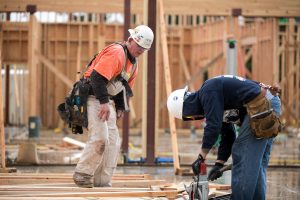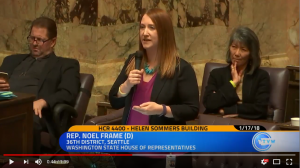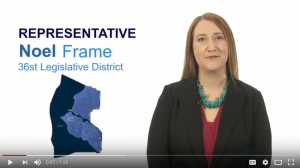The capital budget passed!
 The new $4.18 billion capital budget, which has now been signed into law, will create thousands of jobs in every corner of the state—and it includes a record $1 billion to build public schools and $800 million to build colleges and universities.
The new $4.18 billion capital budget, which has now been signed into law, will create thousands of jobs in every corner of the state—and it includes a record $1 billion to build public schools and $800 million to build colleges and universities.
Key projects in the 36th District funded in the capital budget include:
- $1.9 million for The Seattle Opera, including The Seattle Opera at the Center, a space where students and visitors can view technical and artistic trades and participate in hands-on workshops;
- $258,000 for the Seattle Repertory Theatre for renovations to its PONCHO forum, which hosts audience engagement programs and youth arts education workshops, and serves as a rehearsal hall for mainstage productions;
- $400,000 for the Seattle Aquarium to update existing facilities and add the Ocean Pavilion to better serve visitors;
- $167,000 for the Millionair Club Charity Kitchen, which doubles as a job-training program;
- $15 million from the Distressed Schools Fund to renovate three elementary schools in Seattle; and
- $16.6 million from the School Construction Assistance Program for renovation or construction of elementary and high schools in the Seattle School District.
To learn more about statewide investments check out the Capital Budget Highlights.
Equal Pay and naming the Helen Sommers Building
Last Wednesday the House passed the Equal Pay Opportunity Act, for the fourth year in a row, with strong bipartisan support on 69-28 vote. Immediately following, we approved the naming of the Helen Sommers Building.
It was a powerful moment to vote in favor of both these measures with so many of the hardworking women at the legislature in attendance.
You’ve probably heard that, on average, a woman makes around 80 cents to a man’s dollar for the same work. Women are taking home smaller paychecks and often are not even aware. Many don’t even have the freedom to discuss their own pay, let alone ask for equal pay. That’s right, many businesses don’t allow their employees to talk about wages with coworkers, effectively keeping them in the dark.
The Equal Pay Opportunity Act bans pay secrecy policies, allows discussion of wages, and prohibits retaliation against workers for discussing their pay, or for asking for equal pay and opportunities.
Information is power, and it’s time we empower women with the information and protections they need to get equal pay for equal work!
I am confident the Senate will support the Equal Pay Opportunity Act and send it to Governor Inslee soon, and I’m happy to say that they approved the naming of the Helen Sommers Building the day after the House!
Representative Helen Sommers, who served the 36th District for 36 years, had a distinguished career, chairing multiple committees, writing state budgets, and championing the students of Washington state. She also encouraged other strong, intelligent women to serve in state government, and I’m honored to hold the 36th District House seat that she once held. To learn more, watch my remarks on the floor.
By passing both of these measures, we sent a strong message to women: Be bold. Negotiate hard. Fight for the things you care about.
Dr. King’s legacy of hope
On Monday, we celebrated the deeds and legacy of Dr. Martin Luther King Jr. In her speech on the floor, my colleague, Rep. Kristine Reeves, spoke about the hope that Dr. King inspired in difficult times, and how that hope can still be felt today. She explained that the division in American politics has led many to believe that the system is broken, but reminded us that Dr. King warned against losing faith in the fight for justice. In order to get things done for real people, we have to show up and participate in the process, because civic engagement can change hearts and minds.
I am showing up – for justice, for hope, and for you! I encourage you to join me in participating in the process.
Why does the Legislature…?
This week’s question is one I’ve heard from many of you in your emails so far this session.
Q: Why are some bills from 2017 back in 2018?
The Legislature works within the framework of a two-year cycle, called a biennium. During that time period, there are two regular sessions, a “long” session in odd years (2017) and a “short” session in even years (2018).
Bills that do not make it all the way through during session in the odd-numbered year can be taken up again in subsequent special or regular sessions. These are “carryover” bills.
For example: I sponsored House Bill 1561 to provide open educational resources to relieve students of the financial burden of textbooks. It passed the House in 2017, but did not pass the Senate. Now in 2018, we were able to take the bill up again in the House, and I’m pleased to report we passed it again with a strong bi-partisan vote of 72-24. Now it heads back to the Senate where I’m more optimistic than last year that it will pass!
It is important to note that carryover bills do not prohibit similar or even identical bills from being introduced. Sometimes similar bills are introduced to reflect updates needed based on work in the interim.
For example: In 2017, I sponsored House Bill 1876 to improve how we handle juvenile offenders and our overall criminal justice system. After working with defenders, prosecutors, the Juvenile courts, and my fellow legislators, we were able to improve the policy. This session, I have included the improvements in a new bill House Bill 2895.
Finally, although a bill is considered a carryover, it may not move in subsequent sessions because the intent of the bill was fulfilled in another way.
For example: I introduced House Bill 1251 in the 2017 session to appoint counsel for foster children. Instead of passing the bill, we included a pilot project as an amendment to another bill that made it all the way through the process and was signed into law. Now we will be able to see how effective the policy is, and then potentially write a new bill in a future biennium.
House Bills 1876 and 1251 are “live” bills but neither will move through the legislative process. If a bill does not make it through the process by the end of the two-year cycle, it is “dead.”
Reach out, Stay Involved
Now that the 2018 Session has begun, I want to share my video update on the first weeks of work and how to reach out and participate this session!
Sincerely,

Rep. Noel Frame


